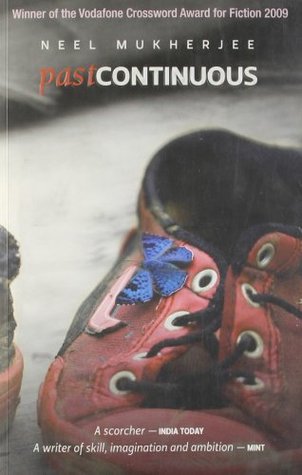
Past Continuous announced the debut of Neel Mukherjee as a novelist who was theretofore famous for his brilliant book reviews. (If you haven’t read his reviews yet, I strongly suggest you do. They’re as good as reviews can get.) It won some minor literary prizes here and there but did not manage to catapult him into the kind of fame that he deserved and garnered later post his Booker nomination for The Lives of Others.
This book carries two narratives – of an Indian student living in the 21st century UK and of an English woman living in India at the dawn of the 20th century. It’s bleak and brutal as you’d expect a Neel Mukherjee novel to be. But it doesn’t succeed in its ambitions to the extent The Lives of Others managed to.
The prose is delicious and Neel conjures phrases and metaphors like a wizard. The characters are well-defined and the themes are powerfully brought out. We are taken through a labyrinth of themes – Poverty, family, despair, escape, pointless addiction, lust, adventure, society, racism, xenophobia, etc. – that synchronize beautifully like the instruments in an orchestra to dictate the coming-of-age tale of our protagonist Ritwik who is born into a lower middle class family in Calcutta, abused violently (I mean VIOLENTLY) by his kinda well-meaning mother (typical middle class mother who only wants her kids to succeed but with a notoriously sadistic streak) and luckily escapes to England on an Oxford scholarship post the death of his parents in quick succession.
Reading about the childhood of Ritwik made me realize how lucky I was in my own. Constantly starving due to poverty, he has nothing to eat for the most part of his childhood. As if the torture of scorching hunger wasn’t enough, he has to face the mocking of his friends when his stomach rumbles during the school assembly and ashamed to admit his hunger, he resorts to several lies and is punished by his teachers for his mendacity. At home, he is viciously punished by his mother who jumps at the slightest of the chances to thrash him, beat him senselessly until he bleeds. At one point she actually grabs him and flings him across the room because he couldn’t memorize a sentence from his textbook. Her anger is understandable (but not condonable) because of the pathetic state of her life – she is married to someone 33 years elder, she is brought up in abject poverty, her own childhood was egregious, her 60-yr old husband gives up a proper apartment in a good neighborhood and she has to face the humiliation of returning back to her mother’s home where her four useless, unemployed brothers constantly thrash their paralytic mother for money. And she takes out all her anger at her son, and how he suffers! His life is human tragedy stretched to its extremity. Soon after the death of his parents, he is exhilarated when he is selected for an Oxford scholarship and is keen on beginning a new life in England leaving behind an apology of an existence. (This is kind of a reverse We Need to talk about Kevin where the son is innocent but the mother’s a psychopath.)
This is not the typical immigrant novel that looks back at homeland with nostalgia and sweet longing. Ritwik wants to escape Bengal, to never come back again and to sever all kinds of connections he might have with his native country. He’s prepared to risk anything to never face again the land of his nightmarish childhood. I’ve read several books about flagrant family lives but Neel Mukherjee’s books stand apart in some way revealing the appalling hatred on which most Indian families miserably thrive.
This book is said to be semi-autobiographical and Ritwik is said to be closely based on Neel himself. I sincerely pray and hope that his childhood was light years away from the horrifying perdition that was Ritwik’s.
The second storyline involves an unmarried Englishwoman living in the early 1900s invited to edify Occidental etiquette to a progressive Zamindar’s wife. Through her, we get a glimpse of Bengal just before it was partitioned hatefully by the British government. She is condescending towards Indians in her own way, but she is more committed towards the progress of the natives than most of her fellow countrymen.
Both the stories are narrated in alternative chapters; with Ritwik’s story being the more interesting in the first part and the Englishwoman’s story sustaining our interest while Ritwik’s narrative flounders in the second.
Towards the end, the book loses steam and anticlimaxes into a desultory, random, avoidable and infuriating end.
Past Continuous was originally published in India and later published as A Life Apart in the UK. I had both the versions and therefore compared every chapter between the books while reading. The UK version omits a few chapters pertaining to Ritwik’s difficult childhood, but it has some additional chapters that explain certain things that are missing in the Indian edition. For example, the Indian version never explains what happened to Ritwik’s brother after he leaves for England. And expectantly, some lines that may offend English people are expurgated in the UK version.
Despite the clumsy second part, this book deserves 4 stars. But Neel Mukherjee is capable of so much more, and hence the rather cruel 3 stars.
Advertisements Share this:




